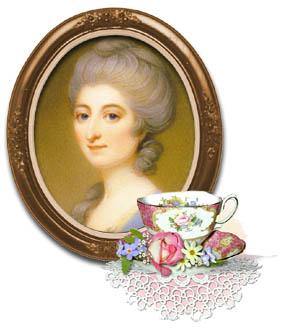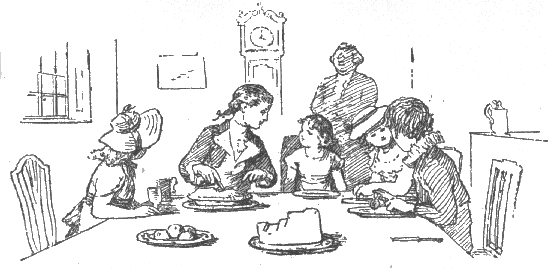Fanny Austen Knight (Knatchbull)
You are inimitable, irresistible. You are the delight of my life. Such letters, such entertaining letters, as you have lately sent! such a description of your queer little heart! such a lovely display of what imagination does. You are worth your weight in gold, or even in the new silver coinage.
Jane Austen to Fanny Knight February 20, 1816

Jane Austen was seventeen in 1793 when her niece, Fanny Catherine Knight, was born. The oldest child of Jane's brother, Edward Austen (later Knight), Jane adored Fanny and thought of her as "almost another sister ... [I] could not have supposed that a niece would ever have been so much to me. She is quite after one's own heart...." Edward (1767-1852) was was adopted in the early 1780's by rich childless cousins of the Austens, Thomas and Catherine Knight.
He was sent by them on the "Grand Tour" of continental Europe in 1786-1788, and eventually inherited their estate of Godmersham, Kent, and took the last name of "Knight". In 1791, he married Elizabeth Bridges. Two years later the couple welcomed their first child, Fanny. Unfortunately for the happy couple, Elizabeth died when Fanny was not yet sixteen (shortly after her 11th confinement).
Fanny's aunts, Cassandra and Jane, who had once been occasional visitors, now took on a much more involved and motherly role in the lives of their nieces and nephews. Cassandra, especially, spent months at a time at the family estate, Godmersham, tending to the needs of her young charges, while her brother grieved the loss of his wife. For Jane, the plight of young Fanny was especially worrisome, as she considered her new role in the family:
Dearest Fanny must now look upon her- self as his prime source of comfort, his dearest friend; as the being who is gradually to supply to him, to the extent that is possible, what he has lost. This consideration will elevate and cheer her. Adieu. Jane Austen to Cassandra October 15, 1808
Fanny had always been particularly dear to Jane and several pieces of Jane Austen's Juvenilia were dedicated to her in her infancy. The two shared a close friendship during Jane's life and several of the letters written between the two of them survive to this day. Fanny seems to have looked to her aunt for the wisdom and advice she could not ask of her mother, especially in the area of love and courtship. Some of these letters have more to say on the subject than any other surviving pieces of Austen correspondence.
Is it possible Jane wrote with the wisdom of one who had loved and lost? Soon after his wife's death, Edward inherited a house and property in Chawton and was able to offer the nearby cottage to his mother and sisters. This close proximity to the family they loved so much must have only deepend the intimacy of the two.  Sadly, Jane never lived to see Fanny married to any of the young men they discussed. In 1820, three years after her aunt's death, Fanny married Sir Edward Knatchbull, 9th Baronet, a widower several years older than herself, with six children. It appears to have been an equitable marriage and Fanny produced nine more children for the Baronet. As Lady Knatchbull she lived a long and full life, dying in 1882 at the age of 89. What she is, perhaps, most famous (or infamous!) for are her recollections, later on in life, about her Aunt Jane. Family members were collecting information about Jane Austen for inclusion in a soon to be written biography. Fanny, writing to her sister Margaret, recalled:
Sadly, Jane never lived to see Fanny married to any of the young men they discussed. In 1820, three years after her aunt's death, Fanny married Sir Edward Knatchbull, 9th Baronet, a widower several years older than herself, with six children. It appears to have been an equitable marriage and Fanny produced nine more children for the Baronet. As Lady Knatchbull she lived a long and full life, dying in 1882 at the age of 89. What she is, perhaps, most famous (or infamous!) for are her recollections, later on in life, about her Aunt Jane. Family members were collecting information about Jane Austen for inclusion in a soon to be written biography. Fanny, writing to her sister Margaret, recalled:
[Jane] was not so refined as she ought to have been from her talent . . . They [the Austens] were not rich & the people around with whom they chiefly mixed, were not all high bred, or in short anything more than mediocre & they of course tho’ superior in mental powers and cultivation were on the same level as far as refinement goes . . . Aunt Jane was too clever not to put aside all possible signs of “common-ness” (if such an expression is allowable) & teach herself to be more refined . . . Both the Aunts [Cassandra and Jane] were brought up in the most complete ignorance of the World & its ways (I mean as to fashion &c) & if it had not been for Papa’s marriage which brought them into Kent . . . they would have been, tho’ not less clever & agreeable in themselves, very much below par as to good Society & its ways.Harsh words, indeed, ungrateful even, and it is easy to see why Janeites the world 'round find it hard to forgive her. Still, Vic, from Jane Austen's World, sums it up nicely, "While Jane died young, Fanny lived to a great age. We know of Fanny’s infamous letter about her aunt written to her younger sister Marianne in 1869, over 50 years after Jane’s death, which did not exhibit the same degree of exuberant affection as Jane’s letters showed towards her niece. But Fanny’s words were written when she was an old woman who was influenced by Victorian sensibilities. In reality, the relationship between Jane and her niece was both loving and complex, for Fanny recalled on numerous occasions her many walks with her Aunt Jane and very interesting conversations and delicious mornings."*
For more information about Fanny Knight Knatchbull, read, Almost Another Sister, by Margaret Wilson (1998) There is an excellent review of the book by author Marilyn Sachs at the JASNA on-line journal Persuasions, entitled Austen’s Ungrateful Niece.
If you would like to learn more about Jane's life and times, peruse our book shop for some great non-fiction reads.



4 comments
Who was at Mersham in 1887
Jill Elizabeth Orr
My great great grandmother was a Georgianna Jane Castle, born in 1806 in Mersham, Kent and I believe worked as Secretary to Lady Knatchbull. In 1842 she married Charles Rhind. A Charlotte Bridges was a witness to their wedding. They had one child, who was named Jane (rumoured to be after Jane Austen) Charles was a private messenger and set up a stationers and receiving and delivery office at 7 Little Sussex place in 1840. I would be fascinated to know if you have any details on Georgianna or Charlotte please?
Andrew C Rhind-Tutt
Catherine
Outraged “Janeites the world ’round” seem to be grossly misunderstanding Fanny’s letter for some reason. These words are not “harsh” or “ungrateful”, so far as I can tell. Aficionados of Jane Austen should certainly be in a position to understand that “refinement” in 19th-century British “society” parlance referred to a set of customs and behaviors particular to some social classes (but not others). One dictionary gives the general definition of “cultured elegance in behavior or manner”. Those who didn’t grow up with some particular style of such “cultured [i.e., artificial] elegance” naturally weren’t accustomed to acting in that so-called “refined” manner. If a close relative says that Jane Austen did not really grow up with this particular manner of “fashion &c”, but instead chose consciously to “teach herself” that style, how can anyone today contradict this observation without other evidence — much less be outraged at the supposed “insult”? Here is what the “infamous” letter from Fanny actually says about her aunt’s characteristics: talented; superior in mental powers and cultivation; clever; agreeable. If JA truly “would have been… below par as to good Society & its ways” without an effort to the contrary, that is no strike against her in my book; and I strongly suspect that JA herself might have heartily approved of her niece’s description! (Remember Jane’s own famous comment about “pictures of perfection”, for example.) Honesty is certainly not ingratitude, much less when it comes to something as arbitrary and (often) silly as societal fashions of “refinement.” Perhaps many of Austen’s fans have not actually read her very carefully?
shuvyah
Leave a comment
This site is protected by hCaptcha and the hCaptcha Privacy Policy and Terms of Service apply.